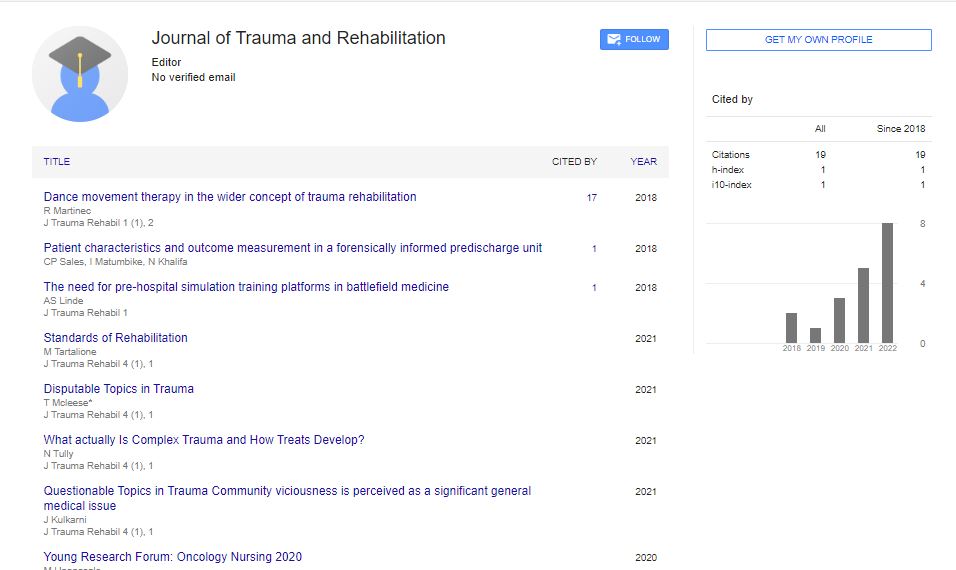Opinion Article, J Trauma Rehabil Vol: 6 Issue: 3
Analysing Post-Traumatic Stress Disorder (PTSD) and Its Treatment
Fehn Zaung*
1Department of Epidemiology & Biostatistics, Peking University, Beijing, China
*Corresponding Author: Fehn Zaung,
Department of Epidemiology &
Biostatistics, Peking University, Beijing, China
E-mail: fehn_zehn@pu22.cn
Received date: 23 August, 2023, Manuscript No. JTR-23-118205;
Editor assigned date: 25 August, 2023, PreQC No. JTR-23-118205 (PQ);
Reviewed date: 08 September, 2023, QC No. JTR-23-118205;
Revised date: 15 September, 2023, Manuscript No. JTR-23-118205 (R);
Published date: 22 September, 2023, DOI: 10.4172/Jtr.1000132
Citation: Zaung F (2023) Analysing Post-Traumatic Stress Disorder (PTSD) and Its Treatment. J Trauma Rehabil 6:3.
Description
Post-Traumatic Stress Disorder (PTSD) is a complex and debilitating mental health condition that can affect anyone who has experienced a traumatic event. While it's often associated with combat veterans, PTSD can also impact survivors of accidents, natural disasters, and other traumatic incidents. PTSD is a psychological condition that occurs in response to a traumatic event or series of events. Trauma, in this context, refers to experiences that are lifethreatening, extremely distressing or beyond the scope of normal human experience. These events can include combat, domestic violence, accidents, natural disasters, or any event that causes significant emotional distress. Not everyone exposed to trauma will develop PTSD, but for those who do, its effects can be profound and long-lasting.
Individuals with PTSD often experience intrusive and distressing thoughts related to the traumatic event. These thoughts can manifest as flashbacks, nightmares, or severe distress when exposed to reminders of the trauma. People with PTSD may go to great lengths to avoid situations, people, or places that trigger their traumatic memories. This avoidance can lead to emotional numbness and disinterest in activities that were once enjoyable.
PTSD can lead to persistent negative thoughts about oneself or the world, feelings of guilt and shame, and distorted blame for the traumatic event. This can result in a bleak outlook on life. Individuals with PTSD often experience heightened arousal, such as increased irritability, difficulty concentrating, an exaggerated startle response, and problems with sleep.
Causes of PTSD
The exact causes of PTSD are not fully understood, but it's believed to be a complex interplay of genetic, neurological, psychological, and environmental factors. Some individuals may be more vulnerable to developing PTSD due to a combination of these factors. Fortunately, there are effective treatment options for those suffering from PTSD. These treatments are designed to alleviate symptoms and help individuals regain control over their lives. Cognitive-Behavioral Therapy (CBT) is a widely used therapeutic approach for PTSD. It helps individuals identify and change negative thought patterns and behaviors associated with their traumatic experiences.
This therapy involves gradually confronting and processing traumatic memories and triggers in a safe and controlled environment. Selective Serotonin Reuptake Inhibitors (SSRIs) and Serotoninnorepinephrine reuptake inhibitors (SNRIs) are commonly prescribed to help manage symptoms of depression and anxiety associated with PTSD.
Eye Movement Desensitisation and Reprocessing (EMDR) is a therapy specifically developed for PTSD. It focuses on reprocessing traumatic memories while the therapist guides the patient's eye movements. Many individuals find it helpful to share their experiences and coping strategies with others who have experienced similar trauma. A healthy lifestyle, including regular exercise, a balanced diet, and adequate sleep, can play a vital role in managing PTSD symptoms.
While treatment options exist, there are challenges to effectively managing PTSD. Mental health stigma can deter individuals from seeking help, making them hesitant to discuss their struggles openly. Some individuals may struggle with treatment adherence, whether due to medication side effects or the emotional impact of therapy. PTSD often co-occurs with other mental health conditions, such as depression and substance abuse. Treating these comorbid disorders can be more complex. Disparities in healthcare access can limit the availability of appropriate treatments for some individuals.
Conclusion
Post-Traumatic Stress Disorder is a serious condition that affects millions of people worldwide. While it can be a challenging and debilitating condition, there is possibility. Effective treatments, including therapy, medication, and lifestyle changes, can significantly improve the lives of individuals with PTSD. It's essential to raise awareness, reduce stigma, and ensure that those who need help receive the support and care they deserve. Understanding and compassion are essential in aiding the recovery of those impacted by PTSD, and it is the collective responsibility to provide them.
 Spanish
Spanish  Chinese
Chinese  Russian
Russian  German
German  French
French  Japanese
Japanese  Portuguese
Portuguese  Hindi
Hindi 